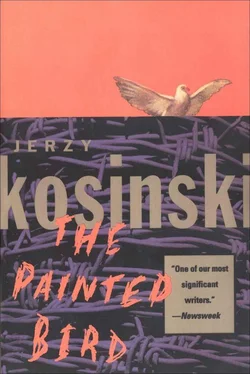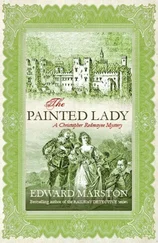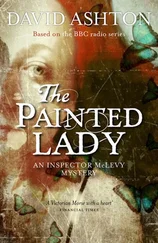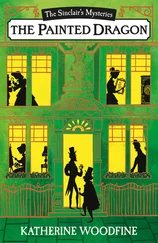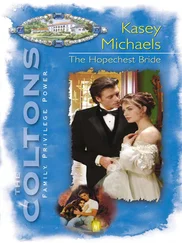Jerzy Kosiński - The Painted Bird
Здесь есть возможность читать онлайн «Jerzy Kosiński - The Painted Bird» весь текст электронной книги совершенно бесплатно (целиком полную версию без сокращений). В некоторых случаях можно слушать аудио, скачать через торрент в формате fb2 и присутствует краткое содержание. Год выпуска: 1965, ISBN: 1965, Жанр: Детская проза, на английском языке. Описание произведения, (предисловие) а так же отзывы посетителей доступны на портале библиотеки ЛибКат.
- Название:The Painted Bird
- Автор:
- Жанр:
- Год:1965
- ISBN:978-0-8021-9575-3
- Рейтинг книги:4 / 5. Голосов: 1
-
Избранное:Добавить в избранное
- Отзывы:
-
Ваша оценка:
- 80
- 1
- 2
- 3
- 4
- 5
The Painted Bird: краткое содержание, описание и аннотация
Предлагаем к чтению аннотацию, описание, краткое содержание или предисловие (зависит от того, что написал сам автор книги «The Painted Bird»). Если вы не нашли необходимую информацию о книге — напишите в комментариях, мы постараемся отыскать её.
The Painted Bird — читать онлайн бесплатно полную книгу (весь текст) целиком
Ниже представлен текст книги, разбитый по страницам. Система сохранения места последней прочитанной страницы, позволяет с удобством читать онлайн бесплатно книгу «The Painted Bird», без необходимости каждый раз заново искать на чём Вы остановились. Поставьте закладку, и сможете в любой момент перейти на страницу, на которой закончили чтение.
Интервал:
Закладка:
Various rumors about the cause of such a sudden death circulated in the village, yet nothing definite was known. Gradually, the younger brother, who eventually took over the property, prospered in wealth and general esteem.
After the accident by the cemetery gate, the skull gave up its wandering and rested quietly in the road dust. Close inspection showed that a large rusty nail had been driven deep into the bone.
Thus, after many years, the victim punished the executioner, and justice prevailed. So it was believed that neither rain, nor fire, nor wind could ever wipe out the stain of a crime. For justice hangs over the world like a great sledgehammer lifted by a powerful arm, which has to stop for a while before coming down with terrible force on the unsuspecting anvil. As they used to say in the villages, even a speck of dust shows up in the sun.
While the adults usually left me alone, I had to watch out for the village boys. They were great hunters ; I was their game. Even my farmer warned me to keep out of their way. I took the cattle to the edge of the pasture, far away from the other boys. The grass was richer there, but one had to watch the cows constantly to keep them from straying into the adjoining fields and damaging crops. But here I was fairly safe from raids and not too conspicuous. Every now and then some herdsmen crept up on me and sprang a surprise attack. I usually got a beating and had to flee into the fields. I warned them loudly on such occasions that if the cows should damage any crops while I was away, my farmer would punish them. The threat often worked and they would return to their cows.
Still, I was afraid of such attacks and did not have a moment’s peace. Every movement of the herdsmen, every huddle, every sign of action toward me filled me with apprehension of some plot.
Their other games and schemes centered around military equipment found in the woods, mostly rifle cartridges and land mines, locally called “soap” because of their shape. To find a cache of ammunition, one had only to walk a few miles into the forest and forage in the underbrush. The weapons had been left by two detachments of partisans who had waged a drawn-out battle there some months earlier. “Soap” cakes were particularly plentiful. Some peasants said that they were left by the fleeing “white” partisans; others swore that they were booty taken from the “reds,” which the “whites” could not carry along with all their other equipment.
One could also find broken rifles in the forest. The boys would take out the barrels, cut them to shorter sections, and fashion them into pistols with handles whittled from branches. Such pistols used rifle ammunition, which was also easily found in the bush. The cartridge was detonated by a nail attached to a band of rubber.
Crude though they were, these pistols could be lethal. Two of the village boys were seriously injured when they quarreled and shot each other with such guns. Another homemade pistol exploded in a boy’s hand, tearing off all his fingers and an ear. The most pathetic was the paralyzed and crippled son of one of our neighbors. Someone played a practical joke on him by placing several rounds of rifle ammunition at the bottom of his comet. When the unsuspecting boy lit his comet in the morning and swung it between his legs, the cartridges went off.
There was also the “powder up” method of shooting. One took the bullet from the cartridge case and poured out some of the powder. The bullet was then pressed deep into the half-empty case and the rest of the powder was placed on top, covering the bullet. A cartridge doctored in this way was then placed in a slot in a board, or buried in the ground almost to the tip, and aimed in the direction of the target. The powder on top was lit. When the fire reached the primer, the bullet shot a distance of twenty feet or more. The “powder up” experts held contests and made bets on whose bullet would go farthest and on what proportion of powder on top and bottom would prove best. The bolder boys tried to impress girls by shooting the bullet while holding the cartridge. Often the cartridge case or detonator hit a boy or some bystander. The best-looking boy in the village had such a fuse imbedded in a part of his body the very mention of which started everyone laughing. He strolled around mostly alone, avoiding the glance or giggling women.
But such accidents never deterred anyone. Both adults and boys traded constantly in ammunition, “soap,” rifle barrels, and bolts, having spent many hours on an inch-by-inch search of the thick undergrowth.
A time fuse was a prize find. It could be traded for a homemade pistol with a wooden stock and twenty rounds of ammunition. A time fuse was necessary to make mines out of soap. All one had to do was stick the fuse into a cake of soap, light it, and quickly run away from the explosion, which would shake the windows of all the houses in the village. There was a big demand for fuses at the time of weddings and baptisms. The explosions were a great additional attraction, and the women shrieked in excitement waiting for the detonation of the mines.
No one knew that I had hidden a time fuse and three soaps in the barn. I had found it in the woods while picking wild thyme for the farmer’s wife. The fuse was almost new and had a very long wick.
Sometimes, when there was no one around, I would take out the soaps and the fuse and balance them in my hand. There was something quite extraordinary about these bits of strange substance. The soaps did not burn well by themselves; but when the fuse was placed inside and lit, it did not take long for the flame to crawl along the wick and produce an explosion that could wreck a whole farmhouse.
I tried to visualize the people who invented and made such fuses and mines. They were certain to be German. Didn’t they say in the villages that no one could resist the power of the German because he gobbled up the brains of the Poles, Russians, Gypsies, and Jews?
I wondered what gave people the ability to invent such things. Why were the village peasants unable to do it? I wondered what gave people of one color of eyes and hair such great power over other people.
The peasants’ plows, scythes, rakes, spinning wheels, wells, and mills turned by sluggish horses or sickly oxen were so simple that even the dullest man could invent them and understand their use and working. But the making of a fuse capable of injecting an overwhelming power into a mine was surely beyond the capacity of even the wisest farmer.
If it was true that the Germans were capable of such inventions, and also that they were determined to clear the world of all swarthy, dark-eyed long-nosed, black-haired people, then my chances of survival were obviously poor. Sooner or later I would fall into their hands again, and I might not be as lucky as in the past.
I recalled the spectacled German who let me escape into the forest. He was blond and blue-eyed, but he did not appear particularly wise. What sense did it make to stay at a small, derelict station and chase after tiny fry like me? If what the head peasant of the village had said was true, then who was going to make all the inventions when the Germans were busy guarding the little railroad stations? It seemed that even the wisest man could not invent very much at such a miserable station.
I dozed off thinking of the inventions I would like to make. For example, a fuse for the human body which, when lighted, would change old skin for new and alter the color of the eyes and hair. A fuse to place in a pile of construction material that could build a house in a day that would be finer than any in the village. A fuse which could protect anybody from an evil eye. Then nobody would fear me and my life would become easier and more pleasant.
The Germans puzzled me. What a waste. Was such a destitute, cruel world worth ruling?
Читать дальшеИнтервал:
Закладка:
Похожие книги на «The Painted Bird»
Представляем Вашему вниманию похожие книги на «The Painted Bird» списком для выбора. Мы отобрали схожую по названию и смыслу литературу в надежде предоставить читателям больше вариантов отыскать новые, интересные, ещё непрочитанные произведения.
Обсуждение, отзывы о книге «The Painted Bird» и просто собственные мнения читателей. Оставьте ваши комментарии, напишите, что Вы думаете о произведении, его смысле или главных героях. Укажите что конкретно понравилось, а что нет, и почему Вы так считаете.
